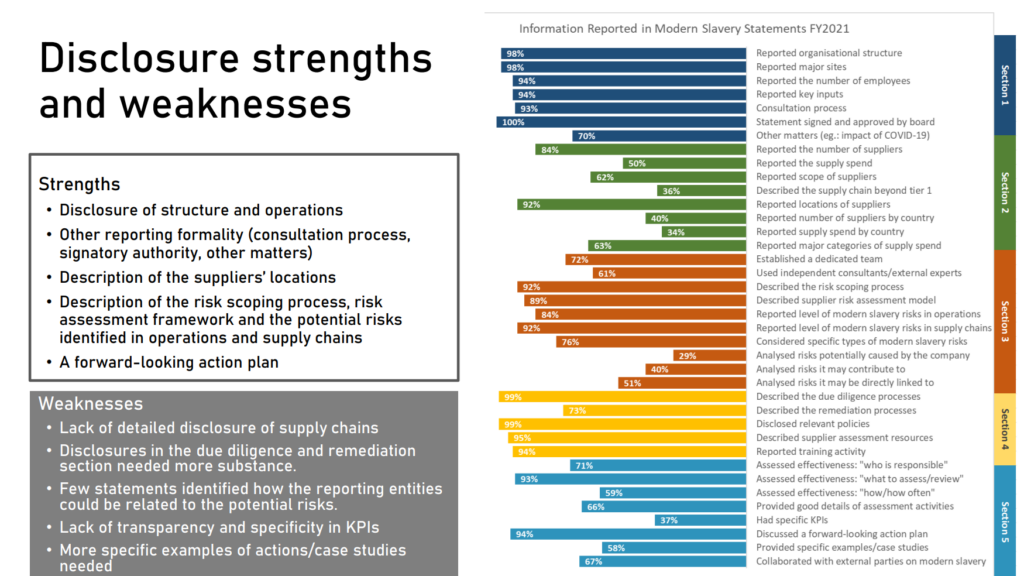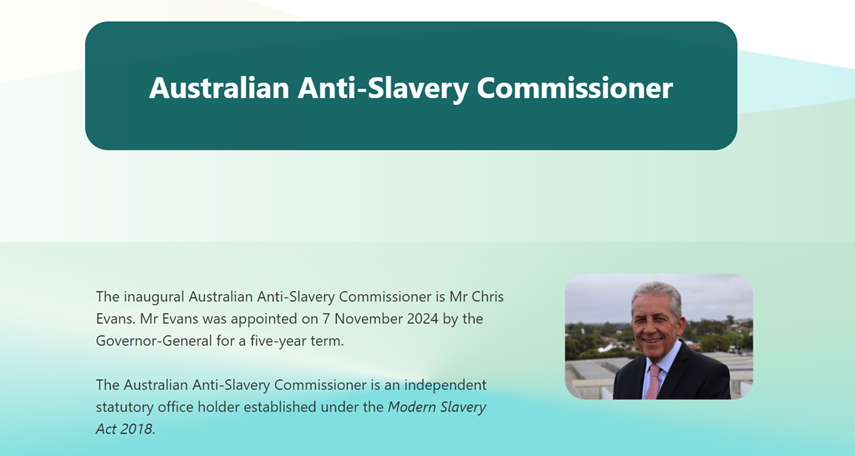Home – Regulations – Modern Slavery Act Australia
What is the Modern Slavery Act Australia and how to comply?

Home – Regulations – Modern Slavery Act Australia

Global estimates of modern slavery are at 50 million, meaning nearly one in every 150 people in the world is in some form of forced labour or forced marriage. The International Labour Organisation estimates that in Australia there are 15,000 people in slave-like conditions. To address this, in 2018, Australia introduced the Modern Slavery Act 2018 (Cth) to combat modern slavery and human trafficking. Here we unpack what the Modern Slavery Act Australia is, who needs to report, statement requirements, quality reporting guidance, the Modern Slavery Act Review and how to comply with the Modern Slavery Act Australia.
The Modern Slavery Act 2018 is a law in Australia that aims to combat modern slavery and human trafficking. The Act requires large businesses and other entities operating in Australia with a turnover of more than $100 million AUD, to report annually on the actions they have taken to address modern slavery risks in their operations and supply chains. The Act is intended to increase transparency and accountability in relation to modern slavery risks, and to encourage businesses to take action to address these risks and protect workers in their operations and supply chains.
The Act lists eight exploitations that are classified as modern slavery, including human trafficking, slavery, servitude, forced marriage, forced labour, debt bondage, deceptive recruitment and the worst forms of child labour, which involve slavery practices or hazardous work involving children.
The Modern Slavery Act Australia applies to entities that have an annual consolidated revenue of at least AUD$100 million and that conduct any part of their business in Australia. These entities are required to prepare a slavery statement each financial year that complies with the reporting criteria presented in the Act.
Companies who do not meet the current revenue threshold may submit a voluntary modern slavery statement. A voluntary statement is often prepared by companies or organisations that want to demonstrate their commitment to addressing modern slavery and human trafficking risks in their operations and supply chains, even if they do not meet the revenue threshold or other criteria required by the legislation. A voluntary modern slavery statement must comply with the same criteria in the Act.
Voluntary statements can be a useful tool for companies and organisations to communicate their commitment to responsible business practices and to encourage transparency and accountability in relation to modern slavery risks. They can also help to build trust with stakeholders and consumers and differentiate the company or organisation from its competitors.
Voluntary statements are becoming more common as organisations mandated to report extend these requirements throughout their supply chain, seeking to better understand how suppliers are addressing modern slavery risks and to evaluate potential suppliers accordingly.
Under the Modern Slavery Act Australia, entities that meet the revenue threshold and operate in Australia are required to prepare a Modern Slavery Statement (MSS) each financial year. To comply with the Act, entities must include the following information:
The statement must be signed off by a director of the highest governing body and submitted to the Australian government for publication on a public registry.
Businesses are required to submit their modern slavery statement within six months of the end of their financial year. For example, if a company’s financial year ends on 31 December 2024, their modern slavery statement must be submitted by 30 June 2025. Similarly, if a company’s financial year ends on 30 June 2025, the statement should be submitted by 31 December 2025.
Monash University publishes an annual research report reviewing modern slavery statements from the ASX 100, which is a good resource on what to do – and what not to do – for companies preparing or revising their statements. This report presents the results of Monash’s Modern Slavery Research program, breaking down disclosure strengths and weaknesses, quality of responses and areas for improvement and provides well-researched insights on how to improve the quality of the modern slavery statement.
Strong Modern Slavery statements address the following:

A review of the Modern Slavery Act Australia was initiated in 2020, with final submissions closing in late 2022. The updates from the review were released December 2024, from 30 proposed recommendations including:
The review was informed by an extensive public consultation process involving over 280 government and non-government organisations, including from business, civil society and academia. 136 written submissions were provided to the review from a wide range of domestic and international stakeholders.
In December 2024 the Australian Government released its response to the review report of the
Modern Slavery Act 2018 (Cth). The Review made 30 recommendations, of which it fully agreed to 13, agreed in principle to 12, and noted five.
Key updates from the Government Review of the Modern Slavery Act include:
With potential penalties for non-compliance on the horizon, organisations must ensure they are fully meeting the current reporting requirements under the Modern Slavery Act. And while the government didn’t commit to implementing mandatory human rights due diligence, they did commit to running consultations on the matter, so organisations would do well to bring themselves up to global best practice standards regarding managing human rights risks in their supply chains.
These developments indicate a strengthened commitment to enhancing corporate responsibility and transparency in combating modern slavery.
As a result of the review, the government agreed to establish an Anti Slavery commissioner and appointed Mr. Chris Evans. This is an independent role aimed at strengthening the country’s efforts against modern slavery. The Commissioner will work with government, businesses, and civil society to improve compliance with the Modern Slavery Act 2018, enhance transparency in supply chains, and support victims.
The creation of an Anti Slavery commissioner has been welcomed by organisations such as the Law Council of Australia. “The Law Council has long advocated for an Australian Anti-Slavery Commissioner and therefore welcomes the passing of this Bill which establishes this important statutory office.” Law Council of Australia President, Mr Greg McIntyre.

We have a team of human rights leaders passionate about supporting organisations on their counter-modern slavery journeys. If you would like to learn more about our human rights services, get support with any of the above steps, or understand how we can help you address modern slavery or wider ESG topics in your business reach out to our team.
We’ve been technical experts and trusted advisors to some of Australia’s most well-known companies for over a decade, contact us to learn more or call +61 3 7035 1740.